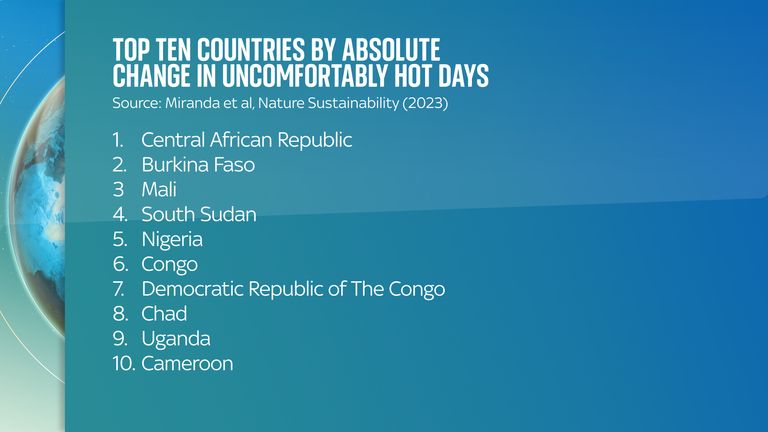The UK and Switzerland will be the worst affected globally by a relative increase in “uncomfortably hot days” on the way, a vast new study has warned.
Homes in the UK and much of northern Europe will suffer more from the relative increase because they are generally designed to keep heat in, leaving these places “dangerously underprepared” for overheating.
“Even a small increase in the temperatures are actually showing a high relative change [in the number of uncomfortably hot times],” which can “make these countries more vulnerable to needing more cooling,” said lead study author Dr Nicole Miranda from Oxford University.
The study defined “uncomfortably hot days” using a complex scientific measure of when people need help cooling down.
It roughly translates to a 24-hour period when the average (mean) temperature is at least 18C, though temperatures could have peaked at around 25C, 30C or even higher.
Eight of the 19 countries with the greatest relative increase in uncomfortably hot days are expected to be in northern Europe
The team worked on the presumption that the world will warm by 2C, as a globally agreed, crucial target of limiting warming to 1.5C looks “increasingly out of reach” – and could even be hit by 2027.
The planet could hit that upper threshold of 2C around the middle of this century, and is on course for around 2.7C by 2100 under current policies, according to Climate Action Tracker.
‘Vicious cycle’ warning
The scientists warned a “vicious cycle” was developing as people try to cope with hotter temperatures.
“By buying more air conditioners, we use more energy, leading to higher greenhouse gases and global warming, and then we buy more air conditioners again,” Dr Miranda told reporters.
“We need to break that cycle.”
That requires things like shutters on windows to block out the sun, better ventilation, different dress codes, ceiling fans, changed working hours – especially outdoors, they said.
But the need for cooling has “not been a a priority in policy documents” like the UK’s Net Zero Strategy and the Heat and Buildings strategy, said Dr Radhika Khosla, who also worked on the study, published today in peer-reviewed journal Nature Sustainability.
This is the latest in a string of criticism levelled at the government for underpreparing for the impacts of climate change.
In March climate advisers warned of the UK’s “critical exposure” to extreme weather like heat. On Monday new research revealed extreme heat last year killed more than 60,000 people in Europe – just as another heatwave grips the south of the continent.
While absolute increase in uncomfortably hot times are expected to increase most in countries in Africa, the scientists were surprised to see that the highest relative increase was in northern European countries – with eight of the top ten in that category from the region.

All countries with the highest absolute change are in Africa
That’s because buildings are not prepared for heat, with dark roofs absorbing heat and windows unprotected from the sun.
An environmental committee of MPs last week launched an inquiry into sustainable ways to help the UK cope with heat.
Conservative MP Philip Dunne, the Environmental Audit Committee chairman, said today: “It is deeply concerning that the UK is among the three countries that will see the largest increase in temperature, particularly as we know that the UK is not yet adequately prepared for the consequences.
“Hotter summers are our new normal: we must learn to adapt to them and to mitigate the harms that extreme hot weather will bring.”
Sky News has contacted the Department for Energy Security and Net Zero with a request to comment.
Watch The Climate Show with Tom Heap on Saturday and Sunday at 3pm and 7.30pm on Sky News, on the Sky News website and app, and on YouTube and Twitter.
The show investigates how global warming is changing our landscape and highlights solutions to the crisis.







